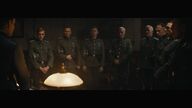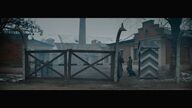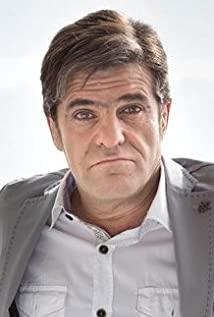At 126 minutes of the movie, the creepiest scene for me is when Koch packs a stack of clothes for Gilles to change, Gilles asks him if this is the clothes of the people who were sent to Poland yesterday, Koch said, no, this is It's mine, I've gotten fat in this camp. Over the years in the concentration camps, Koch not only overcame the instinctive nausea and sympathy of seeing others being abused and mutilated, but even gained weight. In normal times, such a person might be considered a devil, but Mr. Koch is not a devil. He is even gentle with Gilles, the male protagonist most of the time in the play. Poetry that longs for peace.
For most of human history, slaughter has been seen as a backward and ignorant act, in stark contrast to the modern civilization based on science and reason. But the reason why the discussion of concentration camps is so important is precisely because rationality and science are manifested everywhere from the establishment of the concentration camps to the final treatment before their execution and even destruction. As Bowman said in "Modernity and the Holocaust", the concentration camps not only It is not the loss of human beings in modern civilization, but precisely the embodiment of modern civilization.
This is the floor plan of the Auschwitz concentration camp. No one will believe that such a delicate and rigorous layout is only out of great hatred for a nation. This is obviously the result of the designers' careful consideration and repeated consideration, but after careful consideration and repeated consideration, not only there is no Let the designers stop and reflect on why they did it, whether the Jews are really guilty, but completely lost in the refinement of instrumental rationality.
Losing in instrumental rationality and abandoning value rationality is precisely the characteristic of bureaucracy. In such an environment, people no longer ask for the cause and effect of their actions, but only care about the efficiency of their actions. Koch's appearance is to scold a female clerk for scribbled handwriting, and then assign Gilles to register the identity information of the "prisoner" in custody, requiring neat handwriting. Koch has such strict requirements on the handwriting of the record, but I am afraid that he has never read the content of the record seriously, which just becomes the biggest contradiction of the film.
In this "factory", batches of Jews are sent in as raw materials, and work such as killing is meticulously decomposed into multiple processes, and the final product is death. When people kill people, they will conduct moral judgment in their hearts, but under a typical bureaucratic system like a concentration camp, the "standardized process" makes killing from shocking violent incidents to normal work. Become passive "obey orders," demonizing the Jews to downgrade the slaughter of humans to the slaughter of cattle. In this way, the sense of cruelty brought about by human death was completely replaced by instrumental rationality. In front of thousands of corpses, the conscience of the staff was blinded, and they could not feel a trace of cruelty.
In the show, every time Gilles asks about the fate of those who get carried away, Koch replies three times, I don't know, I'm just a cook. But he really didn't know anything about this, I'm afraid it was just a cover-up, otherwise he wouldn't have sent Gilles to the nearby farm on the eve of being sent away by those people. But while he was at ease in his "important position" in this murder factory, he still insisted that he was just a cook. Only when he was questioned by Gilles would his inner moral judgment be activated, and there would be a trace of shame and embarrassment. In such an environment, Koch is the only way to make himself conscientious and logical. Many Nazis will mention when they are tried that they are only executing orders, otherwise they will be executed, but it is very interesting that in the 12 years from 33 years to the fall of the Nazis, there were 24 concentration camps and thousands of "affiliated camps" in Germany. ”, the case of disobeying the superior’s order and refusing to execute the “order” is: 0. Hundreds of thousands of concentration camp workers, for 12 years, carried out the order of the massacre without resistance. Instrumental rationality has completely defeated the sympathy of animal instinct, and technical responsibility has completely replaced moral responsibility.
The blunting of the perception of cruelty is not limited to "hatred of the Jews", in fact, in this camp, and in the entire Third Reich, morality as a whole is corrupted by the absence of moral responsibility. Kraus, the female clerk who was reprimanded and dismissed by Koch because of her scribbled handwriting, turned around and taught a Jewish female worker who violated the "hygienic requirements for kitchen operation", and pressed her hand on the hot iron plate to vent her anger. The same Kraus, just because he was jealous of Max's liking for Jane, went to Koch to report Jane's rumor that the commander of the concentration camp was undersized. She probably knew the consequences of doing so for Jane, but she still chose to report it. In the Third Reich, such incidents abounded, when "moral discussions" were absent from the public sphere. And after the concentration camp chief learned about Jane's rumors about him, he sent her to the front line. Of course, he also knew what it meant to Jane, but as a person in power, he ignored the cruel fate that Jane was about to face. Next in line, Kraus chose to cling to power, turning Jane's fate in a brutal turn.
And the loss of morality is not only limited to the insensitivity to cruelty. In fact, in the whole play, 10 cans can bribe the subordinates. rampant and corrupt. The Third Reich, which pays the most attention to moral cleanliness and social civilization, has finally become a place with the most depraved and corrupt morality.
View more about Persian Lessons reviews











